AESA PROGRAMMES
- Building R&D Infrastructure
- Developing Excellence in Leadership, Training and Science in Africa (DELTAS Africa)
- Human Heredity and Health in Africa (H3Africa)
- Africa’s Scientific Priorities (ASP)
- Innovation & Entrepreneurship
- Grand Challenges Africa
- Grand Challenges Innovation Network
- Rising Research Leaders/Post-Docs
- AESA RISE Postdoctoral Fellowship Programme
- African Postdoctoral Training Initiative (APTI)
- Climate Impact Research Capacity and Leadership Enhancement (CIRCLE)
- Climate Research for Development (CR4D)
- Future Leaders – African Independent Research (FLAIR)
- Critical Gaps In Science
- Clinical Trials Community (CTC)
- Community & Public Engagement
- Mobility Schemes: Africa-India Mobility Fund
- Mobility Schemes: Science and Language Mobility Scheme Africa
- Research Management Programme in Africa (ReMPro Africa)
- Science Communication/Africa Science Desk (ASD)
- Financial Governance: Global Grant Community (GGC)
- AAS Open Research
- CARI Programmes
- Evidence Leaders Africa (ELA)
Climate Research for Development (CR4D)
In October 2018, the Intergovernmental Panel on Climate Change (IPCC) published its Special Report on the Implications of 1.5 degrees warming (SR 1.5), and shortly thereafter UN Environment published its 2018 Emissions Gap Report.
The SR 1.5 concludes that the projected impacts of 2 degrees warming are more dangerous than initially thought and brings us closer to several critical tipping points. The report also cautions that we have only 12 years for drastic action if we are to have any chance of achieving the 1.5 degrees’ target. The UN Environment’s Emissions Gap Report establishes that, despite progress made in the global climate governance regime, greenhouse gas emissions are once again on the increase.
More than any other continent, Africa is already bearing the impact of the instability of the climate system as evidenced by increasingly unpredictable patterns of precipitation and high temperatures. These trends have devastating impacts on the continent’s economies, livelihoods and ecosystems. Drastic and urgent climate action is required to ensure that the continent does not experience worsening climate related devastation and retains some capacity to meet its development aspirations. Drastic climate action will require the engagement of all sectors, interests and stakeholders. A key gap in climate policy and governance in Africa is the weak linkage between science and policy. This gap must be addressed urgently to ensure that development strategies, policies and programmes are climate informed.
The African Academy of Sciences (The AAS), the United Kindgoms’ Department for International Development (DFID) Weather and Climate information SERvices for Africa (WISER) programme and the Africa Climate Policy Centre (ACPC) of the United Nations Economic Commission for Africa on 18 January 2019 announced the implementation of a multimillion dollar initiative to support Africa-led climate science research through the Climate Research for Development (CR4D) in Africa initiative. The CR4D initiative was conceptualized at the Africa Climate Conference in 2013 as a mechanism to strengthen links between climate science research and climate information needs to support development planning in Africa. The initiative addresses climate research priority areas that have been identified in Africa by African researchers.
Over the next year, CR4D will support research into identified priority areas for climate change and development linkages. The research will cover foundational climate science, impacts, information and research translation and engagement with policy and decision-making communities. The goal will be to produce research outputs that inform policy in climate sensitive sectors to better prepare Africa to deal with the impacts of climate change.
CR4D will award 1-year research grants to 15 African climate researchers of up to USD 130,000. Through The AAS Rising Research Leaders programme, grantees will be supported to develop as independent research leaders through training, mentoring, and networking opportunities that will enable international collaborations. CR4D candidates must be hosted by or affiliated with a university, research institute or other eligible institution of higher education in Africa. They must and hold a PhD in climate or related sciences and/or have a proven track record of high-quality, impactful research in a relevant field. Applicants must have a clearly defined scientific research proposal and all African nationals are eligible to apply.
Meet the Team
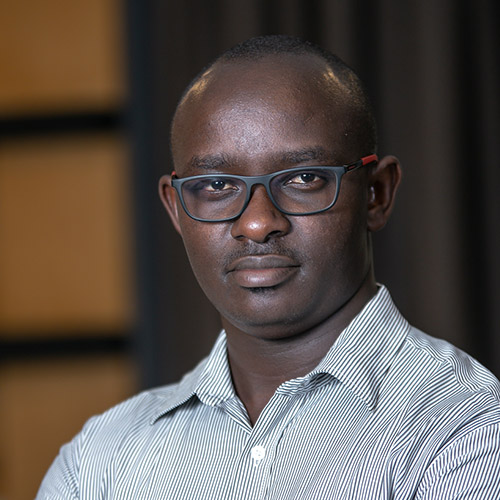
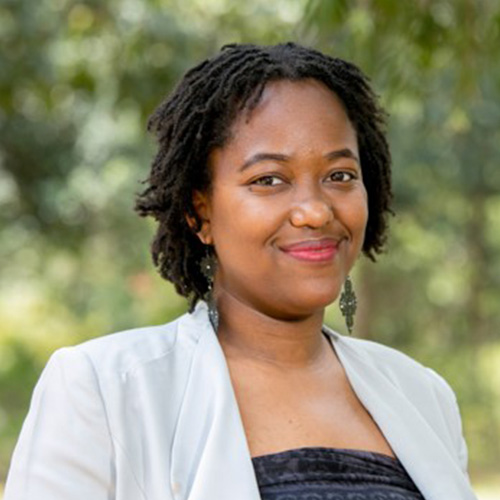
Through The AAS Rising Research Leaders programme, grantees will be supported to develop as independent research leaders through training, mentoring, and networking opportunities that will enable international collaborations. CR4D candidates must be hosted by or affiliated with a university, research institute or other eligible institution of higher education in Africa.
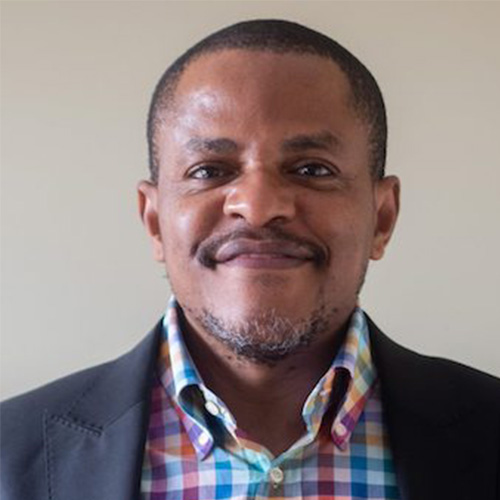 Dieudonne Alemagi
Dieudonne Alemagi Cameroon
Project – Advancing REDD+ Implementation in Ghana and Cameroon
Alemagi graduated from the University of Dschang in Cameroon with a BSc in Biological Science in 1998 and an MSc in Environmental Science from Greenwich University, England, in 2000. His quest for knowledge took him to Germany where he earned another MSc in Environmental and Resource Management from Brandenburg University of Technology, Cottbus, Germany in 2003. He conducted doctoral research on industrial pollution along the Atlantic coast of Cameroon and graduated magna cum laude with a PhD in Environmental and Resource Management in 2006 also from Brandenburg University of Technology. From 2008 to 2011, Dr Alemagi was a Social Sciences and Humanities Research Council (SSHRC) of Canada Postdoctoral Fellow in the Faculty of Forestry at the University of British Columbia. He also worked for close to five years as Climate Change and Policy Associate Scientist with the World Agroforestry Centre at its regional office in Yaoundé, Cameroon.
A large part of Dr Alemagi research is focused on forest policy analysis, reducing emissions from déforestation and forest degradation (REDD+), and other strategies for climate change mitigation and adaptation. During his career, he has published more than 50 publications including peer reviewed journal articles, book chapters, policy briefs, and reports. His papers have appeared in international journals such as Climate Policy, Energy Policy, Forest Policy and Economics, Land Use Policy, Resources Policy, among others. He is currently a principal scientist with Environmental Management and Poverty Alleviation (EMPA) in Fontem, Cameroon.
Project – Advancing REDD+ Implementation in Ghana and Cameroon
While the government of Cameroon and Ghana have introduced a series of initiatives to promote a more sustainable and equitable management of its forests, the rate of deforestation and forest degradation in Cameroon and Ghana remain extremely high. For instance, the rate of deforestation in Cameroon is one of the highest in the Congo Basin while Ghana has one of the highest deforestation rates in Africa and the world. To address this issue, both countries are implementing REDD+ which is a mechanism to support the voluntary efforts of developing countries to mitigate climate change by reducing emissions from deforestation and forest degradation, promoting conservation and the sustainable management of their forests, and enhancing forest carbon stocks. A series of studies relevant for the REDD+ mechanism have been conducted in Cameroon and Ghana. To date, however, studies that examine REDD+ implementation in Ghana and Cameroon and suggest policy recommendations for advancement remains surprisingly slim. Therefore, the overall objective of the project is to identify strategies and approaches for advancing REDD+ implementation in Cameroon and Ghana.
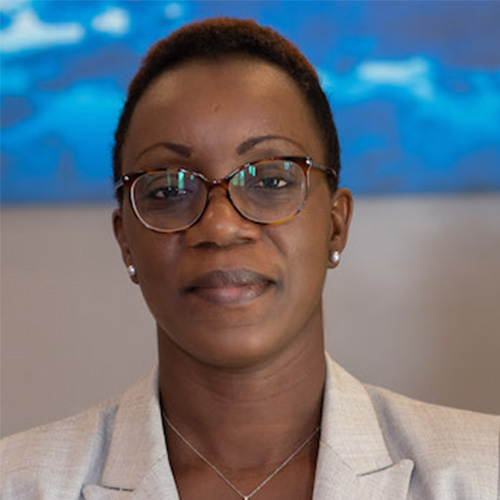 Amin Ariane Manuela
Amin Ariane Manuela Cote D'ivoire
Project - Spillover effect of climate change on cattle economy in Côte d'Ivoire
Amin Ariane Manuela is an assistant Professor in the Faculty of Economics Science and Management, at the Felix Houphouët Boigny University, Côte d’Ivoire. She is also research associate at the Swiss Center for scientific research in Côte d’Ivoire. She completed her PhD at the University of Auvergne in France in 2014 and her research work was titled “Essays on development and biodiversity conservation in Sub-Saharan Africa”.
Amin has been working at the interface of environmental and economic development problematics since 2006. Her research seeks to address challenging development issues,seeking to tackle challenges brought about by the acceleration of economic growth, social development and environmental issues in developing countries. She is currently co-supervising a research group of 40 researchers and is in charge specifically of developing and coordinate research activities in the field of “environmental economics and local economic development“ at the Swiss Centre for Scientific Research in Côte d’Ivoire. Ariane has presented her research findings at several conferences and workshops and published peer-reviewed articles in reputable academic journals.
Project - Spillover effect of climate change on cattle economy in Côte d'Ivoire
Perfect information is essential for efficiency in resource allocation, making informed choices and full employment of resources. However, little has been done to supply decision-makers with contextual-based and evidence-based information to enhance decision making to tackle climate change impacts on regional economy of cattle in Western Africa. The proposed research project aims to fill this gap and investigate the climate risk for cattle trade flows between Côte d'Ivoire and Sahelian countries and assess the cost of inaction i.e. the climate change impacts on the development of this regional economic sector.Specifically, we will (i) capture and model for Côte d’Ivoire the patterns of live bovine animals procurement systems and mechanisms from Sahelian countries, (ii) explore plausible future with related indicators and estimate the impacts and economic costs, induced by climate change scenarios. We will adopt a multi-scale approach combining analysis of data at country level and primary data collected on the field. The study will enable Côte d’Ivoire to anticipate climate risks on food security. At the regional level, climate change mitigation actions may be assessed based on cost of potential damages. Anticipating the climate risk for the development of this sector will also contribute to strengthening regional economic integration.
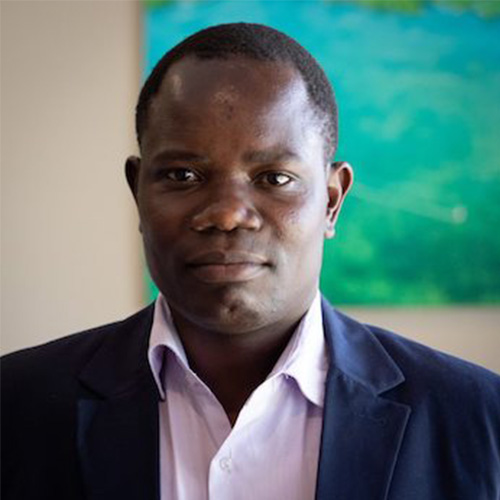 George Otieno
George Otieno Kenya
Strengthening seasonal forecast products as potent tools for early warning information for key economic sectors of the GHA region under the anticipated 1.5/2.0 degrees warming.
Otieno is a climate research scientist, with the Climate Prediction and Diagnostics section of IGAD Climate Prediction and Applications Centre (ICPAC), Nairobi, Kenya. His main role involves the generation of climate information at daily-seasonal timescales for decision making process for weather sensitive sectors of the Greater Horn of Africa (GHA). Otieno completed his PhD at the University of Nairobi in 2018 and his research work was titled “Optimized Cumulus Parameterization in WRF Model for Simulation of Extreme Rainfall over East Africa”. The PhD programme was jointly funded by ICPAC and Korea Meteorological Administration (KMA).
Otieno`s research interest revolves around translation of seasonal climate information for decision making processes at sector levels within the GHA region. He is part of capacity building team at ICPAC that trains meteorologists and other climate users of the National Meteorological and Hydrological Services (NMHS). He is also focal point person for CORDEX East Africa that supports the development and understanding of climate projection science and its impacts. Otieno has published many articles in peer reviewed journals; and partly mentors young career researchers from regional universities and NMHS within the GHA region.
CR4D project scope
The research aims at strengthening seasonal forecast products as potent tools for early warning information for key economic sectors of the GHA region under the anticipated 1.5/2.0 degrees warming. It comes at an appropriate time when the region is faced by frequent climatic variability and change associated with extreme climate events like droughts and floods that hampers the region’s economic stability. The research is an impetus towards value addition in the existing seasonal forecast products and the re-alignment of the same to a much-anticipated climate warming over Africa.
Since the work is a nexus between users and climate science, the collaboration between the former and the latter from main sectors including Agriculture/Food security, Water and Energy and Health will be very fundamental. This work is expected to culminate into several findings including; establishment of the impact of ICPAC seasonal forecasts skill to the sectors for the past 20 years; developed strategies and policies in line with the 1.5/2.0 degree warming that contribute to the national determined contributions (NDCs) of the piloted countries Uganda, Tanzania and Ethiopia.
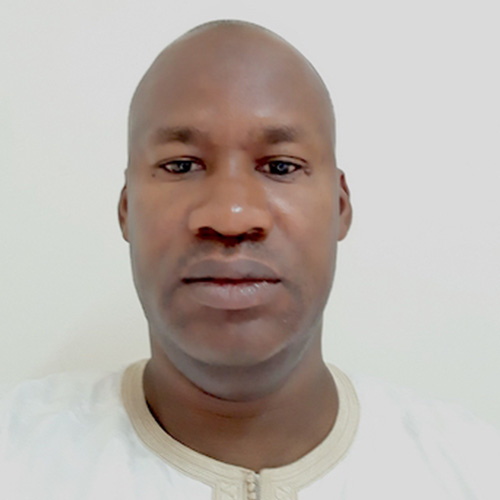 Ibrahima Sy
Ibrahima Sy Senegal
Project: Implementing an early warning system for building communities’ resilience to health impacts of climate change in the North of Senegal (IW4HI)
Sy is an Associated Researcher at the Research for Development Department at the Centre for Ecological Monitoring (CSE) in Dakar, Senegal and Head of the Climate Change and Adaptation Strategies Office. He is currently a Senior Lecturer in the Department of Geography at the University Cheikh Anta Diop (UCAD), Dakar, Senegal. He completed his Ph.D. in Health Geography (Option Environment and Health in urban area) at the University of Strasbourg, France. Previously, he successively worked at the University of Strasbourg (UDS) as associated professor (2004-2006 and 2008-2013), the Swiss Centre for Scientific Research in Côte d’Ivoire (CSRS) as fellow researcher (2007-2009), the Swiss Tropical and Public Health Institute Switzerland (Swiss-TPH) as South Project Leader appointed at the National Institute for Public Health Research (INRSP) in Mauritania (2009-2013) and the Ecological Monitoring Centre (CSE) in Senegal (2014-2016). From January 2016 to June 2017, Dr. Sy coordinated the Research for Development Unit of the Centre for Ecological Monitoring (CSE). Dr. Ibrahima Sy coordinated several research projects tackling the challenges of water, environmental sanitation, spatial epidemiology, climate change and health in Mauritania, Senegal and Côte d’Ivoire in collaboration with several national institutions. The recent research project that he coordinated at the CSE is ACASIS (Heat waves Alert in Sahel and Impact on Health). Sy area of interest is Environmental Sanitation, Spatial Epidemiology, climate change and Urban Health. He is currently supervising three PhD students working on environment, climate change and health risks with particular emphasis on heat waves and health impacts. Sy has presented his research findings at several conferences and workshops in more than 30 peer-reviewed articles in reputable academic journals. He is also involved mentoring more than 50 master students.
Project: Implementing an early warning system for building communities’ resilience to health impacts of climate change in the North of Senegal (IW4HI)
The project is developing a heat health alert system using the bias-corrected CMIP5 RCP climate change projections able to detect heat waves risks and to anticipate their health impact up to 2100. With the phenomenon of increasing temperature, health impacts associated to heat waves become a major public health emergency that particularly affects developing countries located in the Sahelian zone. Faced to this new health issue, the health system actors are trying to provide preventive measures to improve the communities resilience but they have not access to relevant scientific information for managing this type of climate risk consequently. This needs a research to know deeply the heat waves health impact but also to develop climate services that can help manage this risk through a transdisciplinary and multisectoral approach. Building on the results of ACASIS project (Heatwave Alert in the Sahel and Impact on Health) and the BRCCAA (Climate Change and Adaptation and Mitigation Strategies Reference Office) on strengthening capacity in climate information access, the research proposal aims to implement an early warning system for heat waves to strengthen the resilience of the health system and communities against potential health risks. This project is part of the Senegal Climate and Health Initiative, the WMO-WHO programme « Global Health Heat Information Network (GHHIN)", the Sustainable Development Goals (SDGs 3 and 13) and the Health component of National Determined Contribution (CDN).
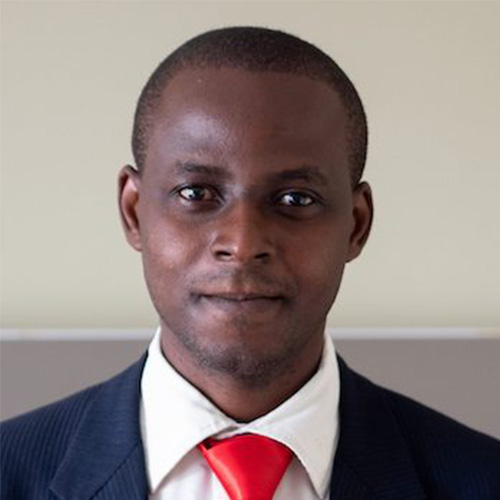 Isaac Mugume
Isaac Mugume Uganda
Project: The Implications of the 1.5-2.0-degree C. to Uganda’s Climate, Agriculture and Water nexus
Mugume is presently an Assistant Lecturer in the Department of Geography, Geo-informatics and Climatic Sciences in Makerere University, Uganda in the School of Forestry, Environmental and Geographical Sciences and in the College of Agricultural and Environmental Sciences at Makerere University, Uganda. Mugume completed his Ph.D. in Meteorology at Makerere University in 2018 and graduated on 15th January 2019. His Thesis is “Optimizing Numerical Models for Operational Weather Forecasting in Uganda” which was funded by the project on “Improving Weather Information Management in East Africa for effective service provision through the application of Suitable ICTs”, i.e. WIMEA-ICT project under the NORHED program.
Mugume has a total of 14 years ’experience (8 years as Meteorologist/Weather Forecaster and 6 years of teaching and research). To date, Mugume has supervised 13 undergraduate students and 1 post graduate diploma student to completion. He's currently supervising 3 Masters students and has examined 1 Masters thesis. Isaac has published articles (https://sites.google.com/site/mugumesite/present-research) 13 in number in peer reviewed international scientific journals in the areas of weather, climate and computing. Isaac is an active researcher on WIMEA-ICT project, BREAD project, BRIGHT project and Water and Society (WaSo) project in the fields of weather and climate.
Project: The Implications of the 1.5-2.0-degree C. to Uganda’s Climate, Agriculture and Water nexus
Mugume is conducting a postdoc study supported by the African Academy of Sciences under the CR4D program and his study is considering the Climate-Agriculture-Water nexus in view of the projected 1.5-2.0-degree Celsius temperature limit. The project will involve regional climate modeling and make future climatic projections for Uganda; evaluate the potential of Uganda to meet the temperature thresholds and how the future climate will impact agriculture and water. The study is expected to contribute to national policies regarding agriculture and water especially the operational Wealth Creation and the Nile Basin Initiative.
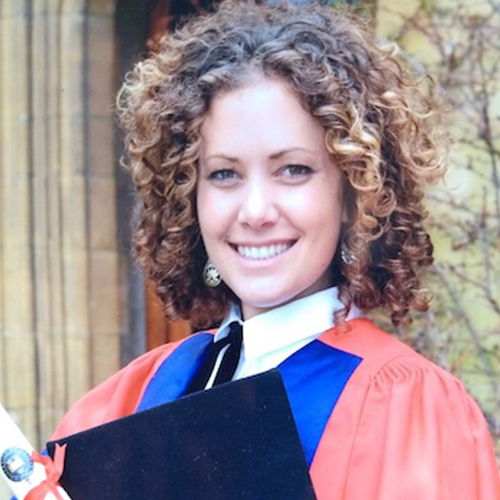 Jessica Thorn
Jessica Thorn Namibia
African Women in Climate Change fellowship
Jessica is a Namibian ecologist with a background in human geography, and a research associate at the University of York, University of Nairobi, and African Conservation Centre. She also holds an African Women in Climate Change fellowship at the African Climate and Development Initiative.
She uses probabilistic social-ecological modelling and scenario analysis to measure impacts of development on land use change. Jessica has been involved in various ESRC, NSF, NERC, NRF, DFID, CGAIR, IDRC, and USAID funded projects, conducting field research in nine countries. Professional activities have been affiliated with UNEP, UNISDR, Conservation International, WWF, CCAFS, CIFOR, Kew, Cambridge, LSE, and Brown University. She completed her BSo CSci(Hons) at UCT, MSc and DPhil at Oxford, and postdoctoral studies at Colorado State University and ETH Zurich.
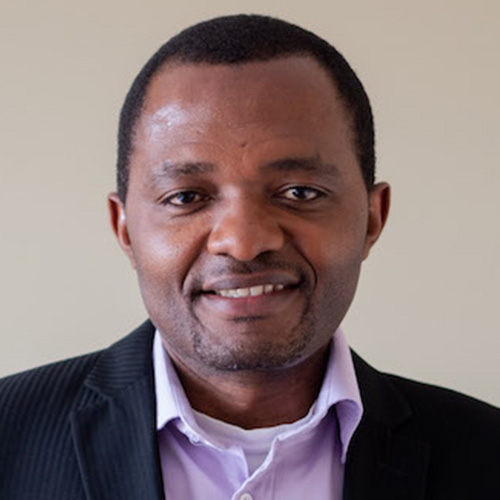 Anderson Kehbila
Anderson Kehbila Kenya
Project - Modelling the transition towards a low-carbon economy in the East African Community.
Kehbila is a Research Fellow in the department of energy and climate change at the Stockholm Environment Institute, Kenya. He completed a Master’s degree in business administration (MBA) at Simon Fraser University, Canada and a PhD in Environment and Natural Resources Management at the Brandenburg University of Technology, Germany. His PhD research work was titled “Development and policy analysis of low-carbon strategies for the sub-Saharan African Automotive Sector” which was funded by the Friedrich Erbert Foundation, Germany.
Kehbila has worked extensively in sub-Sahara Africa where he researched, consulted and collaborated with several international NGOs, multilateral and private sector organizations including EcoXergy Solutions, IITA, Felber and Associés, AWF, ICRAF, UNDP, USAID, AfDB, World Bank and Natural Resources Canada. He has published more than 18 peer-reviewed articles on environment, climate change and natural resource management in reputable academic journals. His research interests revolve around energy-carbon-economic modelling, the quantification of scenarios, multicriteria decision analysis and transition pathways.
Project - Modelling the transition towards a low-carbon economy in the East African Community.
Modelling low-emission transitions involves assessing the dynamic interactions between climate and human activities while including stakeholders and their valuable knowledge in a consensus decision-making process. While decision-makers at all levels of government and of various sectors recognize the need to transition to low-carbon economies, the lack of crucial data on climate impacts and trends, costs and benefits of different policy measures, minimal interaction with other policies and limited mechanisms for cross-scale and cross-sector coordination and collaboration hinders the development of appropriate policies to bring about transformational change. This research seeks to bridge these gaps in science, technology and policy by providing decision-makers with the information and tools they need (i.e. low-carbon economic models, quantified simulation scenarios, transition pathways and indicators) for measuring and evaluating the roll out of policies and programs in the energy, industry and transportation sectors; the key government priority sectors for greenhouse gas mitigation in member countries of the East African Community (Tanzania, Rwanda, Uganda) and Ethiopia.
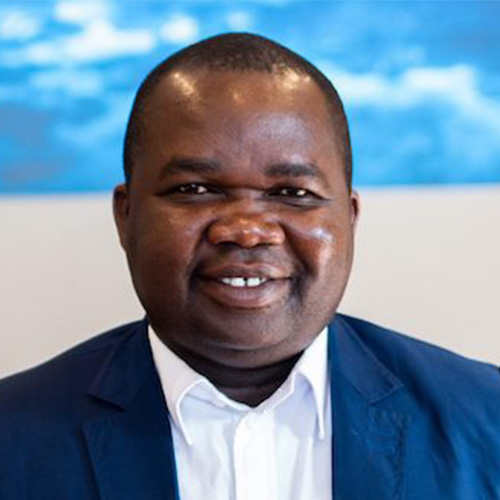 Kouassi Richard M’Bra
Kouassi Richard M’Bra Cote D'ivoire
Project: Impact of climate change on the transmission risk of malaria in southern Côte d'Ivoire
Kouassi Richard M’Bra, is a Lecturer-Researcher in “Institut de Gestion Agropastoral” of University Peleforo Gon Coulibaly of Korhogo, Côte d’Ivoire. He is also an Associate Researcher in the Department of Environment and Health of Centre Suisse de Recherches Scientifiques in Côte d’Ivoire (CSRS).
He completed his PhD at the University Félix Houphouët-Boigny, Abidjan, Côte d’Ivoire in 2017 in collaboration with CSRS and the Swiss Tropical and Public Health Institute (Swiss TPH) in Basel, Switzerland.His research work was titled “Water, sanitation and climate change: integrated analysis of risk factors for malaria and schistosomiasis in Korhogo (Northern Côte d’Ivoire) and Kaedi (Southern Mauritania)” which was funded by the Special Programme for Research and Training in Tropical Diseases (TDR) of World Health Organization (WHO).
M’Bra’s main interests are climate change; water, sanitation and Hygiene (WASH); vector borne diseases and Geographical Information System (GIS).
M’Bra has presented is research findings at several international conferences and workshops. He was awarded the prize for the student best poster during the 4th International One Health Congress & 6th Biennial Congress of the International Association for Ecology and Health, in Melbourne, Australia in December 2016 (https://twitter.com/oheh16students/media).
He is co-authors of 6 peer-reviewed articles in reputable academic journals.
Project: Impact of climate change on the transmission risk of malaria in southern Côte d'Ivoire
The project is analyzing climate and environmental parameters associated with malaria transmission in Tiassalé, a city in Southern Côte d'Ivoire. This is a continuation of M’Bra’s PhD work at understanding the role of rainfall, temperature, NDVI and Land use in the distribution of malaria infection. M’Bra and colleagues have demonstrated that in northern Côte d’Ivoire, an incremental increase of 10 mm of monthly precipitation was, on average, associated with a 1% and a 1.2% increase in the number of clinical malaria episodes one and two months later respectively. This project will provide information about the relationship between climate variables and malaria transmission in southern part which represents the more endemic of malaria of the country. Coupled with the results obtained in northern Côte d’Ivoire, the results of this project will be used to develop early warning systems to forecast periods of high malaria infection risk in Côte d’Ivoire. These actions will help to reduce the burden of malaria in the country.
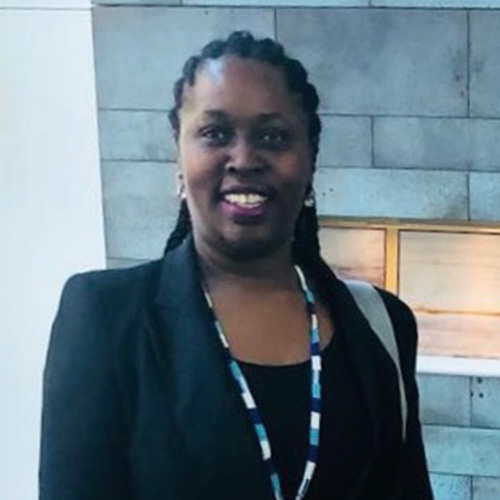 Madaka Tumbo
Madaka Tumbo Tanzania
Project 6: Understanding the Findings of the Intergovernmental Panel on Climate Change (IPCC) Fourth Assessment Report ‘’ Climate Change 2007- Integrating Climate Change Adaptation and Mitigation in Development Planning.
Madaka has more than fifteen years of experience in research and consulting in water resources assessments and management, Environmental Assessments hydrological modeling, climate change impact assessments and adaptation. For the past five years, she has been coordinating the African Climate Change Fellowship Program (ACCFP) funded by the International Development Research Centre IDRC-Canada (www.accfp.org ). Currently, she is the Co-Lead for the Africa Climate Leadership Program (www.africlp.or.ke). The SIDA funded project that she is she is part of the implementing team looks at Linking Public-Private Partnership to Secure Sustainable Water Resources Management in the Kilombero-River Basin. She is also part of the Future Climate for Africa -UMFULA project which is also a multidisciplinary research project funded by DFID. Dr. Tumbo has participated in the development of Scoping Phase of the development of Climate Smart Agriculture Program for Tanzania subcontracted by Adam Smith International (DFID’s Climate Smart Agriculture Programme- Scoping Phase (2015). Dr. Tumbo was commissioned by ILRI to review Climate Change, Agriculture, Food and Nutrition Securities Policy and Strategies in Tanzania. Dr. Tumbo has received international awards from part her research presented during the International Conference on Regional Climate - CORDEX 2013 a partnership between World Climate Research Program, European Union and IPCChttp://wcrp.ipsl.jussieu.fr/cordex2013/poster_best.shtml. The award was based on her work on assessing the Climate Change Impacts on the Hydrology of Rufiji River Basin: The case of the Great Ruaha River Sub Basin, Tanzania. Dr. Tumbo has published 12 papers in peer-reviewed journals. She is currently supervising two fellows that are part of the African Institute of Mathematical Science (AIMS). The two fellows apply mathematical models in developing climate solutions associated with extreme events (i.e. floods and droughts).
PROJECTS AND CONSULTANCIES
Project 1: Linking Public-Private Partnership to Secure Sustainable Water Resources Management in the Kilometre-River Basin
This project aims at establishing sustainable water resources management options and mechanisms firmly founded in state-of-the-science understanding for implementing public-private partnerships for the sustainable development of the Kilimo Kwanza policy in Tanzania. The project also explores the importance of pro-poor and inclusive growth in the implementation of the SAGCOT basically, who (what groups) are likely to gain most, and who might risk being marginalized. The broad question addressed by this research is, therefore; how can the natural resources and their associated biodiversity be managed to provide goods and services equitably and sustainably to the people?
Project 2: Africa Climate Change Leadership Program (AFRICLP)
The overall objective of the program is to develop the leadership capacity of African scientists, policy advisers and practitioners for advancement in current climate knowledge, long-term adaptation, decision-making, and climate action thus improving the effectiveness of science-policy-practice interface for positive impact in society.
Project 3: Technical Backstopping to Support the Assessment of Investment & Financial Flows to Address Climate Change in Developing Countries.
Assisted in the development of the Investments and Financial Flows user guide book and provide training that assisted developing countries ( Gambia, Niger, Namibia) to assess and develop policy options for addressing climate change across different sectors and economic activities, which could serve as inputs to convention negotiating positions. I was responsible for the water sector in the Gambia. The primary targets for capacity building were government officials drawn from various line ministries and government agencies across key economic sectors.
Project 4; African Climate Change Fellowship Program
The African Climate Change Fellowship Program (ACCFP) supported African professionals, researchers, educators, and graduate students to undertake activities that enhance their capacities for advancing and applying knowledge for climate change adaptation in Africa. Participating Fellows received small grants that enable them to visit other institutions where they collaborate with mentors to implement individually-designed projects that.
Project 5: Climate Change Impacts and Adaptation of Water Resources and Agriculture in Tanzania (CLIVET)
The overall objective of the project was to contribute to the development of capabilities of Tanzania to encounter the impacts of climate change and develop best strategies to adapt to these changes, particularly as they relate to water resources and the use of water within the agricultural sector. The project was implemented jointly by IRA, UDSM-Department of Water Resources Engineering, Tanzania Meteorological Agency and Geological Survey of Greenland and Denmark.
Project 6: Understanding the Findings of the Intergovernmental Panel on Climate Change (IPCC) Fourth Assessment Report ‘’ Climate Change 2007- Integrating Climate Change Adaptation and Mitigation in Development Planning.
This project aimed at injecting the best available scientific knowledge from the IPCC Climate Change 2007 report and other sources into policy processes and decision-making in the targeted countries and regions. Specific objective: Broaden support for the integration of climate change mitigation and adaptation into national strategies for sustainable development and poverty reduction.
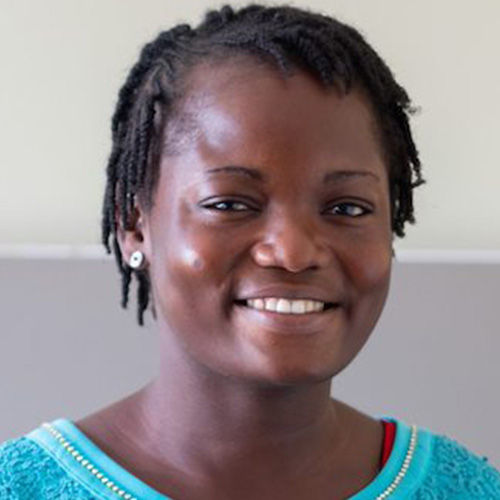 Marthe Montcho
Marthe Montcho Benin
Project - Adaptation strategies of dairy livestock women cooperatives to climate change in Benin, Niger and Burkina-Faso (West Africa)
Montcho is an associate researcher at the Animal Science Research Laboratory of the Faculty of Agricultural Sciences (University of Abomey-Calavi, Benin Republic). She holds her PhD in Animal husbandry and livestock production systems in 2018. Her research work was titled “Nutritional values and valorization of crop residues and agro-industrial by-products in the feeding of ruminants in Benin in the form of multi-nutritient blocks”.
Marthe has completed two scientific research internship at Livestock Development and Environment Research Laboratory of University Nazi Boni (Bobo-Dioulasso, Burkina Faso). She has several scientific publications in French and English. Her research interests are animals feeding, pastoralism, animal’s resources management, livestock and environment preservation, Gender and Economic of Livestock systems. Marthe Montcho has presented her research findings at several regional and international conferences and workshops.
Project - Adaptation strategies of dairy livestock women cooperatives to climate change in Benin, Niger and Burkina-Faso (West Africa)
The project aims to explore different strategies adopted by dairy livestock women cooperatives to face climate change in three West African countries (Benin, Niger, Burkina-Faso) economically based on livestock and milk production. This is an extension of her PhD work which aims to assess and find out the strategies for developing livestock value chain and ensure food security under climate change. The dairy women in Sub-saharan Africa are facing severe constraints in adoption of dairy production technologies and maintaining the quality and clean milk production. Milk being a very nutritious medium to almost all kinds of microorganism, gets spoiled very quickly when it is exposed to outside environment. With dry season becoming too long and increasingly warmer, the collection of milk of good quality is a great challenge. It is agreed that dairy cooperatives productivity is highly affected by climate change. Climate directly affects the quantity and the quality of the milk. But there is no previous study on adaption strategies used by dairy women livestock cooperative to meet the challenge of climate change. She is going now to survey the factors determining and characterize strategies used by dairy women cooperatives to face climate change, evaluate the impact of each strategy on milk production and milk quality, assess the effect of each adopted strategies on women income, simulate and model the best strategies that could be used by dairy women cooperatives to address climate change, improve milk production and their profit.
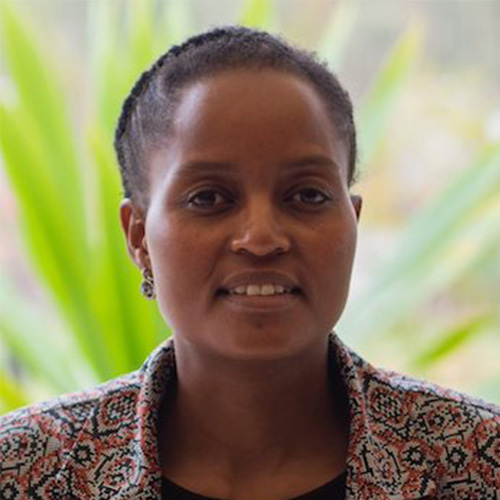 Mary Jane Bopape
Mary Jane Bopape South Africa
The improvement of weather simulations over southern Africa through the modification of boundary layer and microphysics schemes in numerical weather prediction (NWP) models.
Weather and climate extremes can have a big impact on the society and the economy especially in the African continent where weather and climate sensitive sectors make a large contribution to the Gross Domestic Product (GDP).
Early warning systems can help save both life and property, and these rely on the use of numerical models and earth observations. Running numerical models with high resolution and over large domains, require the use of high-performance computing (HPC) facilities and these have largely been unavailable in the African continent.
In the Southern African Development Community (SADC) region, HPC systems have been deployed recently through the implementation of the SADC Cyberinfrastructure (CI) framework and national initiatives, which means, models can now be run with high resolution in research or operational mode. These models are however characterised by errors especially when simulating thunderstorms that can be associated with extremes such as strong winds, hail, tornadoes and heavy rainfall. This research focuses on the improvement of weather simulations over southern Africa through the modification of boundary layer and microphysics schemes in numerical weather prediction (NWP) models.
The model simulations will be used to develop products for the agriculture, water, disaster risk reduction, energy and health sectors. A large component of the project is also to build numerical modelling human capacity in SADC through training workshops and engagements with international experts.
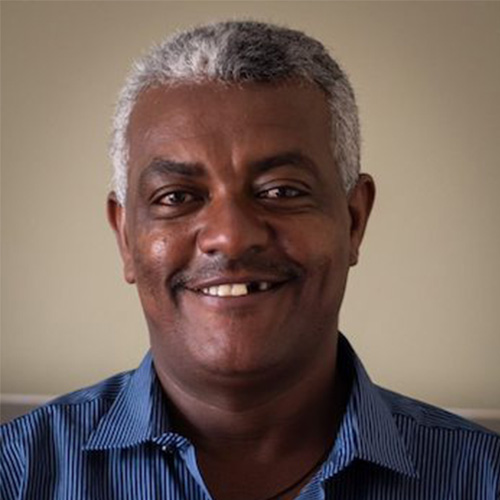 Mekonnen Adnew Degefu
Mekonnen Adnew Degefu Ethiopia
Project-Multiple datasets and drought-indices for supporting the mitigation of and adaptation to drought in Ethiopia
Degefu is an assistant professor in the Department of Geography & Environmental Studies in the College of Social Sciences and humanities,Debre Markos University Ethiopia. He completed his PhD at Addis Ababa University in 2014, and his research work was titled “Rainfall and streamflow in the Omo-Ghibe River Basin of Ethiopia: Trends, extreme events and teleconnections with some global climate drivers” which was funded by Livestock-Climate Change Collaborative Research Support Program (Colorado State University), Climate Science Research Partnership (CSRP) Met Office, UK) and African Climate Change Fellowship Program (ACCFP), University of Dar Salam, Tanzania.
Degefu’s research area and interest is hydroclimate variability and climate change adaptation issues. He has accomplished many research works including the international level research programme called Adaptation at Scale in Semi-arid Regions in collaboration with Addis Ababa University and University of East Angelia and Cape Town. He has presented his research outputs in many international conferences and workshops including AMMA and Adaptation Futures, and published more than 7 peer-reviewed articles in reputable journals. He also supervised more than 30 MA and one PhD student, and currently supporting more than 10 MA students.
Project-Multiple datasets and drought-indices for supporting the mitigation of and adaptation to drought in Ethiopia
The research project intends to identify and communicate geospatial datasets from big global data sources and drought indices that have better performance in characterizing the complex spatiotemporal drought development over Ethiopia. It also aims to identify the drivers of drought development by analyzing the couple drought variability and large-scale climate oscillation system, and evaluate data performance in simulating these teleconnections. He is hosted by Department of Geography & Environmental Studies, Addis Ababa University, Ethiopia. For effective implementation of this research project, he is conducting a study in collaboration with local, regional (ICPAC) and global scale (University of California and Loughborough University, UK) research organization and practitioners. This study is anticipated to enhance drought hazard mitigation and adaptation efforts by working the proposed research interactively with key practitioners and policy makers and effectively translating the research results into practical actions.
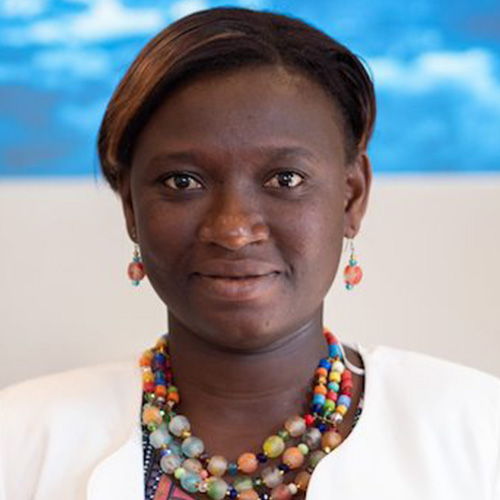 N’Datchoh Evelyne Toure
N’Datchoh Evelyne Toure Cote D'ivoire
Flood Risk Reduction under Paris Agreement (FLORR-PA)
Toure is a climate scientist at the Laboratory of Atmospheric Physics of the University Felix Houphouet-Boigny (UFHB) of Abidjan, Cote d’Ivoire. She completed her PhD in 2015 from Federal University of Technology Akure (FUTA) with a thesis titled “West African aerosols and their impacts on regional climate” within the framework of WASCAL and ICTP STEP scholarships. She earned a postdoctoral position in Laboratoire d’Aerologie of Toulouse where her work consisted of climate modeling and investigating uncertainties in African biomass inventories and atmospheric pollution impact on Human health. N’Datchoh’s area of interest covers from aerosols and their impacts, to climate change and extreme events. She has presented her findings at numerous workshops and conferences and done a dozen of peer-review articles published in international climate journals.
Project
This project Flood Risk Reduction under Paris Agreement (FLORR-PA) aims to provide valuable information about projected flood occurrences in three West African cities of Abidjan (Cote d’Ivoire), Dakar (Senegal) and Ouagadougou (Burkina Faso) under global warming target of 1.5oC and 2oC along with pre- and post-disaster strategies to mitigate and manage the risk. The current highest death toll, losses and damages is still hitting these cities and are associated with global warming amplification despite efforts of providing robust information on climate extremes and hazards occurrences. Also, past climate hazards characterization may allow generating information about their future occurrences. Therefore this project results will provide a catalog of the extreme precipitation events and the related flood hazards and disasters; a wiki list of key indicators for flood occurrences in the three cities; multi-model ensemble-based climate change information for flood occurrences highlighting most vulnerable areas under 1.5o C and 2oC global warming and report on best practices and barriers for an efficient pre- and post-disaster management and reduction.
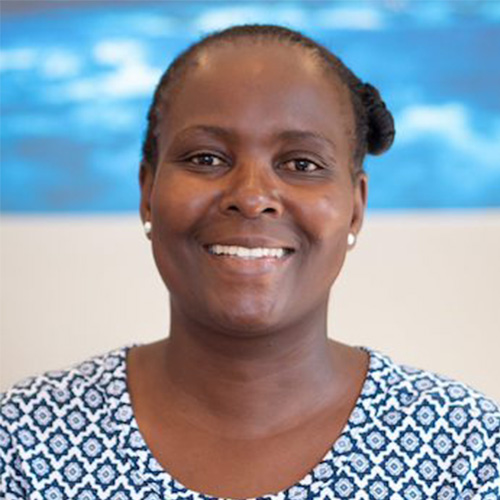 Olga Laiza Kupika
Olga Laiza Kupika Zimbabwe
Project – Building adaptive capacity to cope with effects of climate change on riparian based ecosystems and livelihoods in semi-arid areas of Zimbabwe
Olga Laiza Kupika is a Senior Lecturer in the Department of Wildlife Ecology and Conservation in the School of Wildlife, Ecology and Conservation, Chinhoyi University of Technology. She completed her PhD at the Chinhoyi University of Technology in 2017 and her research work was titled “Climate change, Green Economy and Conservation: Implications for livelihoods and wildlife policy in the Middle Zambezi Biosphere Reserve, Zimbabwe” which was funded by the European Union under the Delivering Innovation and technology through the Reinforcement of Agricultural and Multidisciplinary (DREAM) research capacity for the benefits of small-scale farmers in Trans frontier Conservation Areas project. The study was conducted in the framework of the Research Platform “Production and Conservation in Partnership”. Olga is a Climate Impact Research Capacity and Leadership Enhancement (CIRCLE) programme cohort 1 (2015) post-Masters Fellow. The programme was funded by the Department for International Development (DfID). She was hosted by University of South Africa under the Exxaro Chair in Business and Climate Change. Olga’s area of research interest is climate change adaptation, ethnobotany, biodiversity conservation and livelihoods. She is currently supervising 1 MPhil student who is working on ethnobotanical assessment of indigenous plants to promote drought resilience in a semi-arid savannah. Olga has presented her research findings at several conferences and workshops and done more than 14 peer-reviewed articles in reputable academic journals. Apart from teaching, she is also involved in research and mentoring several undergraduate and 5 postgraduate students.
Project – Building adaptive capacity to cope with effects of climate change on riparian based ecosystems and livelihoods in semi-arid areas of Zimbabwe
This transdisciplinary study aims to explore the impact of climate change on riparian based ecosystems and livelihoods dependent on two perennial river systems, in the south eastern Lowveld, Zimbabwe. The project will adopt a case study approach whereby two study communities located along the margins of the rivers in drought prone districts will be selected to collect data using smart-mobile phones. The project addresses the following thematic areas: Impacts, information, and translation, communication focusing on enhanced added-value in sub-seasonal to seasonal predictions across the areas of water, biodiversity conservation, and agriculture and disaster mitigation. The study will be conducted in collaboration with local communities, government departments, local communities, civic organizations and other NGOS. Findings from the study will contribute towards documentation of ecosystem and community-based strategies used by communities to cope with changes in the flow regime of perennial river systems and packaging of possible interventions to manage and restore riparian ecosystems and livelihoods dependent on perennial rivers.
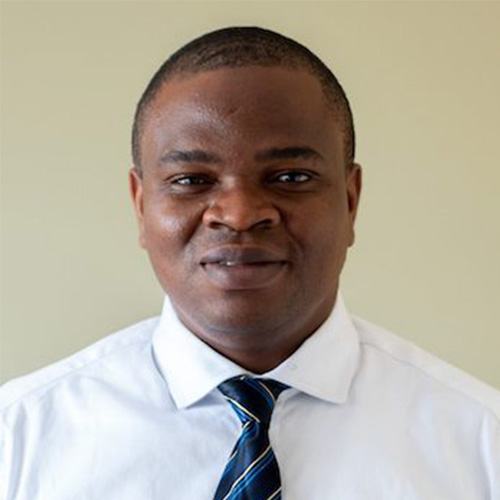 Olumuyiwa Bayode Adegun
Olumuyiwa Bayode Adegun Nigeria
Project – Strengthening climate adaptation within informal settlements
Adegun is a Lecturer in the Department of Architecture, School of Environmental Technology, Federal University of Technology, Akure. Nigeria. He completed his PhD at the School of Architecture and Planning, University of the Witwatersrand, Johannesburg (Wits) and his thesis focused on “Informal Settlement Intervention and Green Infrastructure: exploring just sustainability in Johannesburg”. The work was supported with funding from Carnegie Corporation’s Next Generation of African Scholars Programme at Global Change Institute, Wits.
Adegun’s area of research interest is environmental sustainability in housing and low-income urban settlements. He has presented his work internationally and published on aspects of housing, green infrastructure and informal settlements in reputable peer-reviewed and popular outlets. Apart from teaching, he is currently mentoring 8 postgraduate students.
Project – Strengthening climate adaptation within informal settlements
Through a collaborative (transdisciplinary) approach, this project is seeking to strengthen climate change adaptation and enhance disaster risk reduction at the local level. The study is based in coastal informal settlements within Lagos and Dar-es-Salaam – two of the major coastal cities in sub-Sahara Africa. It will map risks across the spectrum of projected impacts (sea-level rise/flooding, windstorm, heat stress), identify local-level adaptation practices and co-produce low-cost, community-based and transferable adaptation initiatives relevant to the built environment. The anticipated value of the project’s approach lies in greater possibility of translating the research to action for transition into sustainable and resilient pathways at the local scales.
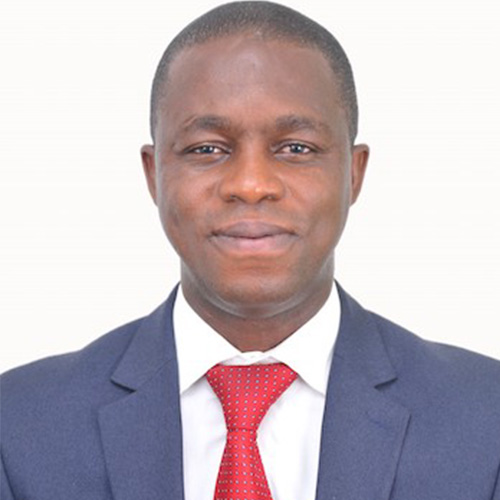 Philip Antwi-Agyei
Philip Antwi-Agyei Ghana
Project: Mainstreaming Climate Services for Resilient Agricultural Systems and Sustainable Development in Ghana and Implications for West Africa
Antwi-Agyei is a Senior Lecturer at the College of Science, Kwame Nkrumah University of Science and Technology, Ghana. He completed his Ph.D. at the University of Leeds, United Kingdom in 2013 and his Ph.D research focused on the “vulnerability and adaptation of Ghana’s food production systems to climate change and variability” which was funded by the Commonwealth Scholarships, United Kingdom.Agyei is an interdisciplinary environmental scientist whose research focuses on developing innovative multi-scale approaches for assessing vulnerability to climate change for dryland and fragile farming systems in sub-Saharan Africa. Agyei’s research uses spatial databases, ecological surveys and field-based participatory studies to achieve a broader understanding of how climate change affects food production and rural livelihoods.
Antwi-Agyei was a Lead Author for the Intergovernmental Panel on Climate Change (IPCC) Special Report on the impacts of global warming of 1.5 oC above pre-industrial levels, where he worked closely with other scientists across the globe on “Sustainable Development, Poverty Eradication and Reducing Inequalities”. He has presented his research findings in several international conferences and published extensively in reputable academic journals. He has been a Visiting Researcher at the Centre for Climate Change Economics and Policy, University of Leeds, United Kingdom. Currently, Philip is co-supervising three (3) finishing PhD students, 5 MPhil/MSc students and 15 undergraduate students.
Project: Mainstreaming Climate Services for Resilient Agricultural Systems and Sustainable Development in Ghana and Implications for West Africa
Whilst the capability of improved climate information services to reduce climate impacts is alluring, empirical evidence on how to mainstream climate information services is lacking. Philip’s project addresses this important research gap to advance knowledge on how to mainstream climate information for resilience building in Ghana. Findings from Philip’s research will contribute to building a climate change resilience (SDG13) that will result in more resilient livelihoods (SDGs 1 and 2). This project will also identify the opportunities and institutional challenges for mainstreaming climate information services, whilst supporting the further development of Nationally Determined Contributions and Climate Change Policies of Ghana by informing adaptation practices of smallholder farmers.
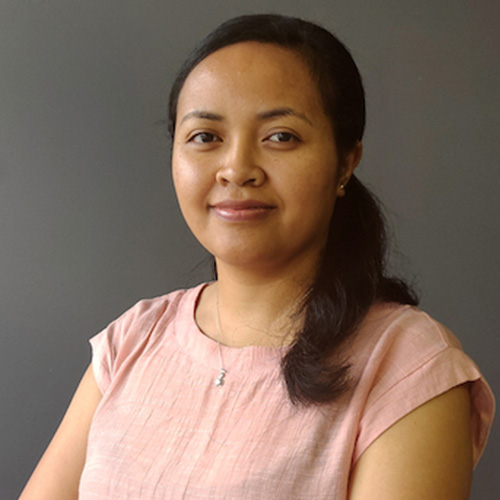 Rondrotiana Barimalala
Rondrotiana Barimalala South Africa
Project - Climate Resilient development for Southeastern African islands. (CRISTAL)
Barimalala is currently a postdoctoral researcher in the Department of Oceanography, University of Cape Town. She is part of the team working on “uncertainty reduction in climate models for understanding development applications” over central and southern Africa, a consortium under Future Climate for Africa. Barimalala received her PhD, focusing on tropical Atlantic teleconnection and its impacts on the Indian Ocean interannual variability, from the joint program between the University of Trieste and the International Center for Theoretical Physics, in collaboration with Georgia Institute of Technology. She is a lead author for the IPCC 6th assessment report, Working Group I, AR6 Climate Change 2021: The Physical Science Basis.
Project - Climate Resilient development for Southeastern African islands. (CRISTAL)
The CRISTAL project aims to enhance a climate-conscious development in the southwest Indian Ocean (SWIO) region. The economic growth of the African island states over SWIO is threatened by the impacts of climate change. There is however a limited understanding of the basic mechanisms that drive the climate variability in the area; analyses of conventional climate model outputs, both present day and projections under different global warming levels are very scarce. The critically limited climate information available for major climate-sensitive decisions hampers these countries’ efforts toward sustainable development. With a focus on Madagascar, CRISTAL will contribute on scientific understanding of the climate variability and change in the island. It will also build an effective transdisciplinary research to integrate a science-based knowledge into the country’s climate-sensitive decisions, climate change adaptation and mitigation plans as well as on the national risk awareness.
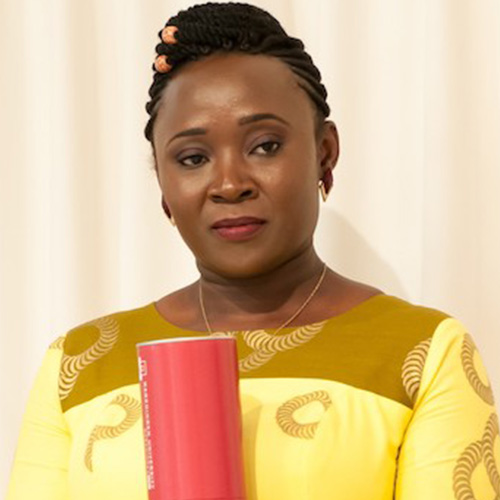 Stella Kabiri-Marial
Stella Kabiri-Marial Uganda
Project - Plasma N2: Emissions saving through production of low-cost Fertilizers using air as a raw material
Kabiri-Marial is a Senior Research Officer and Programme Leader for Technology Promotion and Outreach at Mukono Zonal Agricultural Research and development institute (MUZARDI) of NARO Uganda. She completed her PhD at Wageningen University, in the Netherlands in 2017. Her research broke ground on the “Ecology and Biology of Rhamphicarpa fistulosa, a new parasitic weed of rain-fed rice in Sub-Saharan Africa”. Her study was funded by NWO-WOTRO Science for Global Development, in the project PARASITE, “Preparing African rice farmers against parasitic weeds in a changing environment”. Her findings highlighted the future expansion of parasitic weeds considering climate change, from which she published 4 papers and a book.
Stella currently coordinates scaling-up and scaling-out proven agricultural technologies through farmer adaptive research, in the Lake Crescent Agro-ecological Zone of Uganda.
She aims to increase utilization of improved technologies and innovations by
specifically rural communities in the face of Climate change. Stella has published widely in peer reviewed journals and presented her research findings at several international conferences. Apart from research, she is also an external examiner for PhDs at Makerere University and mentors’ undergraduates interested in early careers in science.
Project - Plasma N2: Emissions saving through production of low-cost Fertilizers using air as a raw material
This project is developing a green-energy driven technology solution to support the on-site fertilizer production in Africa, providing cost-affordable, green-made Nitrogen fertilizers to local small-scale farms. The research is based on nitrogen fixation with non-thermal Plasma technology. Using nothing else but air as a raw material, NOx gases (mixture of NO and NO2) are produced through a chemical reaction in Plasma which is generated from a variety of renewable energy sources (solar, wind or bio-energy). This research will enable the production of low-cost liquid fertilizers on demand to be applied directly to the soil, dissolved into irrigation water, or foliar application.
The prospect is to demonstrate a way out of the industrial Haber-Bosch process that produces 130 million tons of Ammonia (NH3) per year but is one of the leading environment polluters. Production of fertilizers through this process consumes approximately 1 -2% of the world’s total energy, 3-5% of the world’s total natural gas output and emits 300 million tons of CO2. An alarming factor for global warming. Using new opportunities in renewable energy and innovative process design concepts, this project bears promise to lead to new paradigms of Green chemistry technologies for sustainable agricultural systems in Africa.
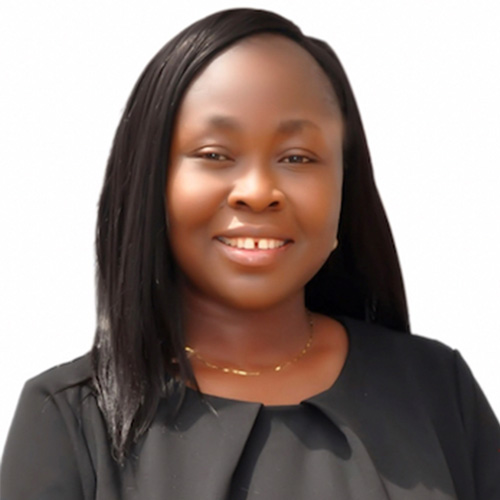 Dimphna Ezikanyi
Dimphna Ezikanyi Nigeria
Project- Impact of weather variability on aeroallergens and allergic diseases; implication on public health in Nigeria and adaptation
Ezikanyi is a Lecturer I in the Department of Applied Biology, Ebonyi State University, Abakaliki, Nigeria. She obtained her Ph.D. Degree from the University of Lagos, Nigeria with her Ph.D. research titled “Spatial distribution of atmospheric pollen and spores in Nigeria’’. She has carried out some research on airborne pollen and spores in some parts of South-East and Northern Nigeria. Dimphna has presented her research findings in several conferences and workshops in Nigeria. She has published over 17 manuscripts in peer review open access journals. She is currently the Coordinator of Work and Study Programme in her Department. Dimphna is mentoring and supervising over 15 undergraduate and 1 postgraduate students.
Project- Impact of weather variability on aeroallergens and allergic diseases; implication on public health in Nigeria and adaptation
The research focuses on accessing the rate of weather variability in different climatic regions in Nigeria; coastal, equatorial and arid from 1983- 2019 and evaluates current impact of weather variables on aeroallergens and allergic diseases. The research will also examine aeroallergens spatial distribution in coastal, equatorial and arid regions of Nigeria and data generated will be used to produce aeroallergen calendar which will reveal aeroallergens risk periods and guide asthmatic patients and other hypersensitive individuals on prophylactic approaches. The work will also reveal the allergenic potential of plants, which will inform climate policy in selection of non-allergenic plants in tree planting approach to mitigation, in view of projected increase in Co2 level. The work will develop allergen specific immunotherapy for the prevention of allergic diseases and evaluate the prophylactic and curative potentials of Mucuna pruriens seed and Euphorbia hirta in attenuating allergies. My pilot study on antiallergenic potential of Mucuna pruriens seeds, seem promising.
Ethiopia
Project: Intergenerational Education Mobility in Africa
Eleni is a postdoctoral research fellow at the University of Pretoria. Her research focuses on applied research in poverty dynamics, the socioeconomic effect of shocks (such as climate change) and social mobility in Africa. Eleni was a World Bank and European Investment Bank (Global Development Network) fellow. Before perusing her Ph.D., Eleni worked for the National Bank of Ethiopia and the Netherlands development organization, SNV. She earned a master’s degree in public policy and a doctorate in economics from Maastricht University.